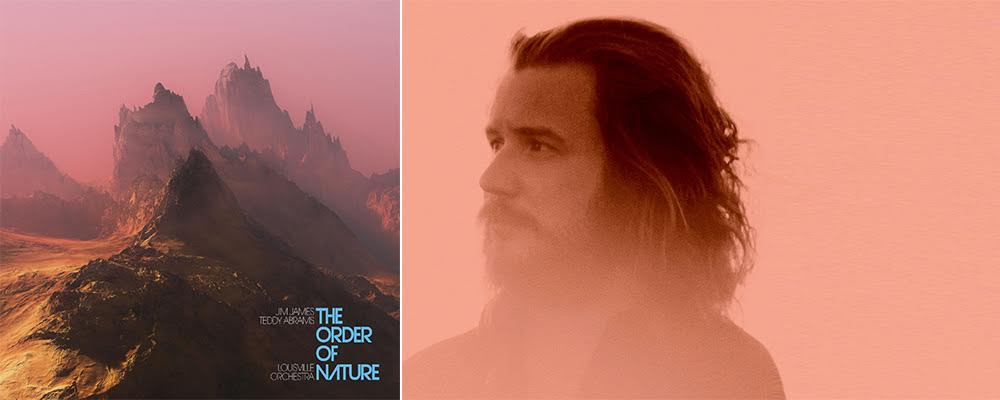Jim James Tackles Open Space on ‘The Order of Nature’
Adi Mehta
Jim James is best known as the frontman of My Morning Jacket and one of the few contemporary indie music figures that both forces music forward and demands popular attention. For his latest album, “The Order of Nature,” he teams up with director-conductor Teddy Abrams and the Louisville Orchestra for a collection of songs that give his signature style the magnifold treatment. The album embraces long-lost styles, and strikes as a refreshing reminder of detail and distinct. It’s an ode to nature, taking inspiration from the surroundings in all their detail, and rendering them into poetic imagery.
Regarding the inspirational thought behind the album, James has said, “Humans are part of nature obviously, but why do we have this thing called hatred and how do we get rid of it?” going on to vent, “We’re fighting nature and thinking we can prevail over nature, but we’re killing each other and killing the planet.” The first song of the album, “Walking In the Snow,” is directly addressed to this end, with lyrics vividly justifying the album title, drawing the listener into nature, and ending up declaring “Hate has nowhere to go.” As cute as this traditional hippie posturing can be, it does get a bit twee, because James’ question is silly to begin with. We have hatred because we have emotions, which set us apart from the rest of the nature that James continually refers to. And along with it, we have love, which is manifest in this album, outweighing the hate, and James makes an inspirational example of the better qualities of humankind taking the reins.
“Walking In the Snow” conjures a ‘60s spirit in both attitude and sonic texture, arpeggios, choirs, and strings, a blast from the past in terms of orchestration and production. Teddy Abrams and the Louisville Orchestra strike as a refreshing resurgence of all the lost majesty that has largely given way to quick tricks. James is a beaming nature child on this track, bleating lyrics like “Love universal / the order of nature / Hate has no way to go.” A brilliant feature of this album is the cohesion, and it makes its grandest display in the transition between the first two tracks. There’s a seamless blend and cathartic release upon the beginning of “Here in Spirit.” After the wandering musings of the opener, the thoughts get a proper anchor, and everything glides away. There’s a warm tone to the song, and when James sings, “Go on and be with the light,” he’s working with plenty of momentum, gospel affectations falling neatly into place.
The album continues seamlessly, and come “The Human Touch,” the songs are revealing a dimension to James that never impressed themselves in My Morning Jacket. The orchestral backdrop recalls “The Dreaming”-era Kate Bush, but with everyman, deadpan vocals, conveying a type of nomadic musician’s wisdom. This song is very much the spirit of Tim Buckley — folk instincts taken fantastical avenues, This aesthetic becomes more pronounced yet on “In Demand,” a dramatic, string-laden outpouring. Gospel choirs underline James’ implicit undertones. When he sings, “There are things that they can’t take / They can’t take our love,” his austere vocal atop the lush string arrangement is the perfect representation of a voice persevering, unadulterated emotion.
“Back to the End of the World” is way too similar to Elvis Presley’s “Can’t Help Falling in Love.” It’s not an uncommon thing for a burst of spontaneous inspiration to, ages after, reveal itself a mere rehashing of found sounds. The similarity here is too uncanny, and any reaction elicited from the melody should be redirected toward the original. Luckily, “Who Am I” saves from this egregious offense, many times over. This is the track that encapsulates the album, that concentrates James’ creative energy, realizes his vision, and showcases his brilliance. It’s a Leonard Bernstein composition, which might have something to do with it, but that isn’t to discount James. The song lets him shine, as its fanciful stylings fit with the orchestral ebullience of the album, and especially make a platform for James to take liberties.
“Over and Over” sounds like a ‘60s showcase special, and at this point the act is getting a bit tired. James enlists “The Mamas & the Papas”-type backing vocals, and it sounds just fine, but not special. Midway, the fiddler takes charge, and steals the show, making for one of the most memorable moments of the album. After all this filigree, James recedes to a restrained backdrop on “Set It To Song.” It’s the sound of comfortable smugness, without quite all the arrogance. James sings “Daylight, darkness,” and concludes “I’ll set it to song.” And he does it well. The gospel choirs and intense strings continue.
The final song serves as a proper encapsulation of the album, being a clean slice through all the nonsense. The only standout feature is that the band actually acknowledges its nonsense on “Same Ole Lie.” James sings about complacence, poking fun at religions, and concluding that’s a shame. The song is the perfect conclusion point for the album. James outlines all his prior points, dropping optimistic dazzles, but ending with a series of cymbal blasts. It’s a comeback album in the broadest of terms, which means it speaks directly, without any nonsense. The modes of conveyance can be hit-and-miss, but that’s what’s viscerally appealing about music in general — talking about things that need talking about. “The Order of Nature” does it to a good tune.
“The Order of Nature” is available Oct. 18 on Apple Music.

